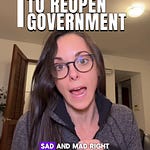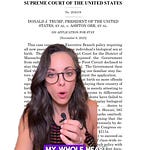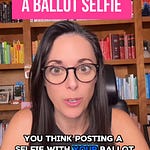The Supreme Court just gave the government permission to stop you for being brown, for speaking Spanish, or for working a low-wage job. The US Constitution should protect against this, but yesterday, it didn’t.
This case makes me sick.
The case: Noem v. Vasquez Perdomo
In June, federal immigration agents launched a coordinated enforcement blitz across Los Angeles and its surrounding counties. They didn’t bring warrants. They didn’t bring individualized suspicion. What they brought were rifles, masks, unmarked vans, and a terrifying mandate.
They showed up at bus stops, day laborer pickup sites, farms, car washes, donut shops, even parks.
They targeted people based on four things:
apparent race or ethnicity
whether they spoke Spanish (or English with an accent)
what kind of work they did
and where they happened to be standing
That’s it.
They tackled people to the ground.
They handcuffed U.S. citizens.
They loaded people into vans without asking a single question.
They called it “Operation At Large.”
The district court said: Absolutely not.
They issued a temporary restraining order, finding that these stops violated the Fourth Amendment. Because when a set of factors describes “a very large category of presumably innocent people,” it can’t possibly qualify as reasonable suspicion. This was blatant racial profiling.
But then the Supreme Court stepped in.
What SCOTUS just did
On September 8, the Court granted an emergency stay—allowing the government to resume those exact same tactics while the case continues.
The Supreme Court just ruled that immigration officers can stop you solely because you look Latino, speak Spanish, and work a low-wage job.
Justice Sotomayor dissented, joined by Justices Kagan and Jackson, calling it exactly what it is:
“We should not have to live in a country where the Government can seize anyone who looks Latino, speaks Spanish, and appears to work a low-wage job.”
But the majority chose to ignore that.
They ruled that these stops are permissible under the Fourth Amendment.
They decided that the government’s interest in immigration enforcement outweighs your constitutional right to exist without being treated like a suspect.
What this means for all of us
The government does not need more power to stop and detain people. It already abuses the power it has.
I’ve spent my entire career representing people who were stopped for “fitting the description,” for having an accent, for walking while Black or brown. I’ve watched courts look the other way.
Now the Supreme Court has cleared the way for these tactics to continue—at least for now.
And this ruling doesn’t just impact immigrants.
It affects every single person who exists in public while being part of a marginalized community.
If they can stop you for being brown and holding a wrench, they can stop you for anything.
I hate to have to say this. But if you have the appearance of being Latino, please carry your documents with you.
Not because you should have to—but because I’ve seen what happens when you don’t.
And if you want a longer legal breakdown of the case, let me know—I’m already working on one.
We don’t have to accept this
We don’t have to accept a country where race is reasonable suspicion.
We don’t have to normalize ICE vans pulling up to bus stops and tackling people.
We don’t have to hand over more unchecked power to a government that already abuses it.
We can speak up. We can organize. We can fight back.
And we absolutely must.
In Solidarity,
Eliza
If you found this post useful or urgent, please consider sharing it, subscribing, or becoming a paid supporter. This work takes time, and we’re up against powerful forces. But together, we are not powerless.











